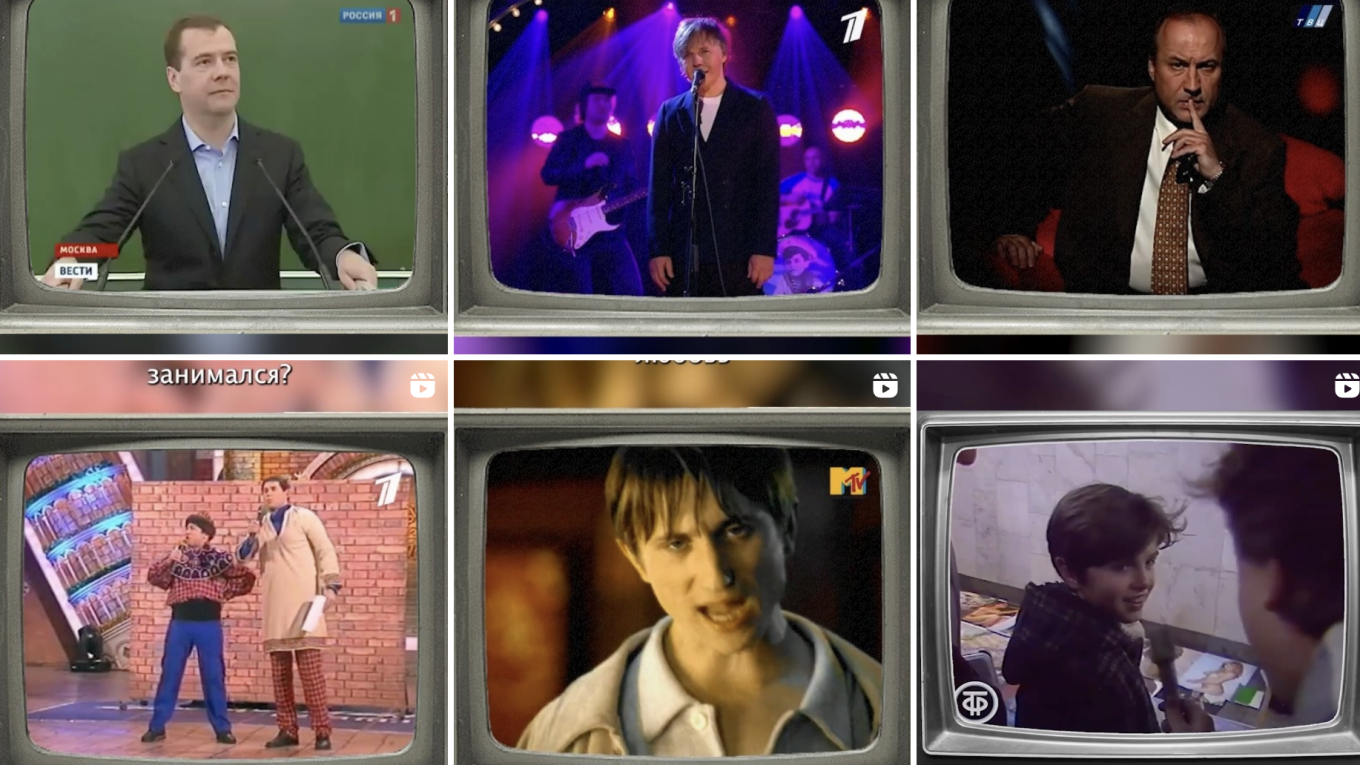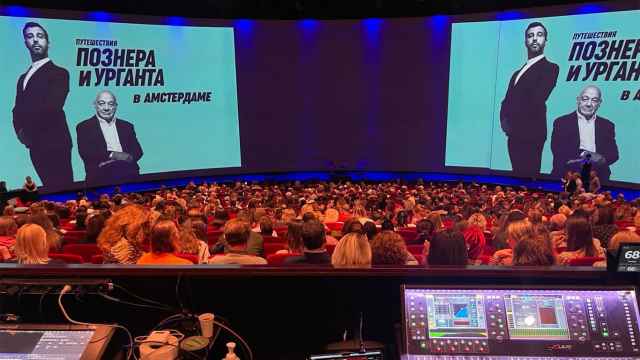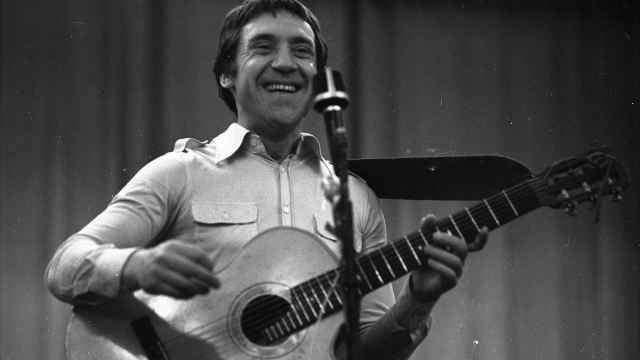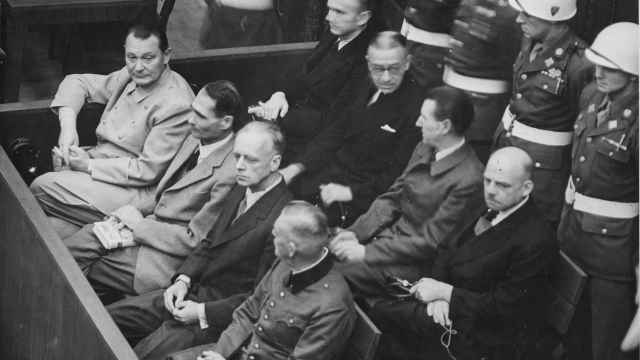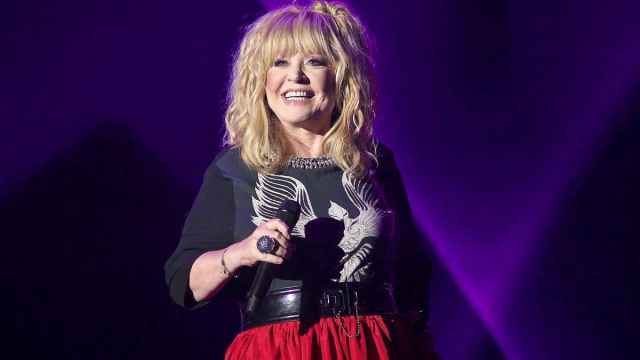Sting singing “I hope the Russians love their children too” from a Moscow TV studio. Appearances by Facebook CEO Mark Zuckerberg and interviews with Ukrainian politicians. Political satire on the country’s top comedy show.
None of these things would appear on television in today’s Russia, which has been isolated from the West and under strict Kremlin control since the invasion of Ukraine. But just a few years ago, they did.
One small online project is trying to revive the relative freedoms of pre-war Russian television by posting short, catchy clips of television broadcasts from the 1990s, 2000s and 2010s.
“The television we lost”: that’s how the project A Chto Po TV (What’s on TV?), which has almost 270,000 Instagram followers, describes itself.
“I decided to start this channel to show the contrast between the television we used to have, for example in the 1990s and 2000s, and what we have nowadays. So everyone can see the difference,” Alexander, 38, A Chto Po TV’s creator, told The Moscow Times.
In many ways, the project also shows a country that was lost.
“I want people to watch these videos and reflect on why this happened and how we lost it. And why the television we have now is a mouthpiece for propaganda,” he added, asking that his last name be withheld because of his opposition views.
In recent years, the Kremlin has intensified pushing its narrative of Russian nationalism, anti-Western sentiments and “traditional values” through state-run TV channels — the main news source for roughly two-thirds of Russians.
Since the February 2022 invasion of Ukraine, Russian state television has justified the war by claiming the Kremlin “had no other choice” but to invade, while talking heads and hosts claim President Volodymyr Zelensky is a drug addict and portray the war as a “liberation” of Ukrainians from Kyiv’s “Nazi” regime.
A Chto Po TV shows a drastically different television, with many figures whose lives and careers have radically changed since the invasion.
One video posted by the project shows American actor Elijah Wood’s 2013 appearance on the popular late-night talk show Vecherniy Urgant (“Evening Urgant”) on Channel One, the country’s main state-run broadcaster.
Vecherniy Urgant has not aired since February 2022, when its host Ivan Urgant expressed his opposition to the war against Ukraine. The channel said the show was suspended due to a scheduling problem.
In a 2003 clip, Novaya Gazeta journalist Anna Politkovskaya speaks to television anchor Vladimir Solovyov on the air. Politkovskaya, who was famous for her reporting from Chechnya, was assassinated on President Vladimir Putin’s birthday in 2006. Today, Solovyov is a leading propagandist and a vocal cheerleader for the war in Ukraine.
Another clip shows the Kultura TV (Culture TV) channel’s broadcast of the prestigious 2022 Golden Mask theater awards. Among the winners shown is playwright Svetlana Petriychuk for her play “Finist, the Brave Falcon.”
Today, Petriychuk and director Yevgeniya Berkovich are on trial for “justifying terrorism” in the play, which is about Russian women who fall in love with Islamic State militants in Syria, and have been added to Russia’s list of "terrorists and extremists."
Many artists and singers who were banned from performing in Russia and blacklisted from television because of their anti-war views can still be seen in clips posted by A Chto Po TV — like Ilya Lagutenko from the Mumiy Troll rock band, Russian rapper Noize MC and poet Vera Polozkova.
The project also posts clips of cartoons, films and advertisements from the 1990s as well as old interviews with politicians including the late Kremlin critic Alexei Navalny.
Although Alexander said he doesn’t watch present-day Russian television, he said his knowledge of the media landscape helps him run the project.
“I’m a spectator, I’ve always been on the other side of the screen,” said Alexander, an engineer by training who later took courses in video editing.
“However, I watched a lot of TV in my childhood and I believe my expertise helps me,” he said, adding that the project was also inspired by renowned British filmmaker Adam Curtis’ documentaries made from archival footage.
Alexander — like thousands of Russians — left the country after the invasion of Ukraine. In 2023, he launched A Chto Po TV from Georgia, a popular hub for Russian emigres, including exiled journalists.
Russian authorities have blocked more than 130 media outlets since independent reporting on and criticism of the invasion of Ukraine were outlawed soon after the war started.
Television remains the main source of information for at least 65% of Russians, a percentage that rises to 85% among older age groups, according to a survey published by the independent Levada pollster last month.
Last week, Channel One ran segments describing how Russian troops were advancing on Ukraine's frontline, describing Russian soldiers as “defenders” and asking viewers to donate money for military equipment.
Channel One host Dmitry Kiselyov — who regularly references the prospect of nuclear war on the air — opened his news program last month with nuclear threats.
“In the West, people are increasingly asking the question: Will Russia use nuclear weapons? The answer is yes, but under what conditions?” Kiselyov asked during his Sunday primetime show Vesti Nedeli (“Weekly News”).
Yet comments published under A Chto Po TV’s videos show that many Russians appear to long for the days when their country gave a platform to politically independent musicians and Western celebrities.
“This clip takes you back to a carefree youth,” Yana Minaeva, a follower of A Chto Po TV, commented under a clip from a 2009 TV concert.
“Where there are no horrors like those we are experiencing now.”
… we have a small favor to ask. As you may have heard, The Moscow Times, an independent news source for over 30 years, has been unjustly branded as a "foreign agent" by the Russian government. This blatant attempt to silence our voice is a direct assault on the integrity of journalism and the values we hold dear.
We, the journalists of The Moscow Times, refuse to be silenced. Our commitment to providing accurate and unbiased reporting on Russia remains unshaken. But we need your help to continue our critical mission.
Your support, no matter how small, makes a world of difference. If you can, please support us monthly starting from just $2. It's quick to set up, and you can be confident that you're making a significant impact every month by supporting open, independent journalism. Thank you.
Remind me later.



